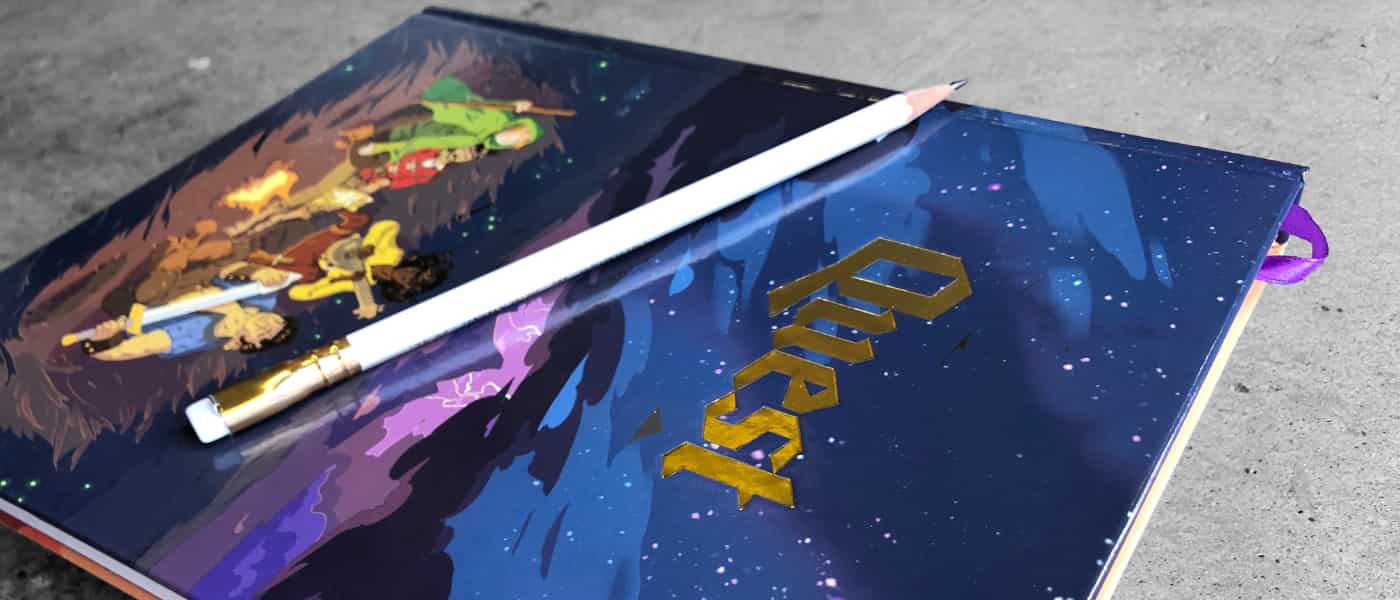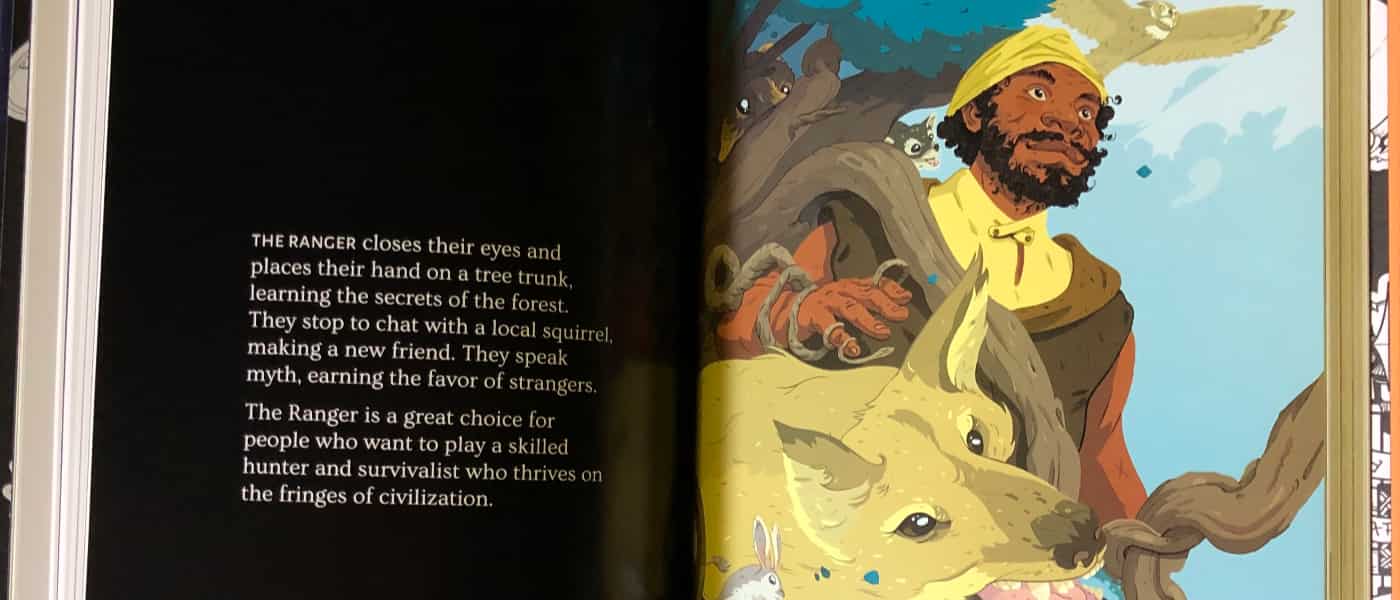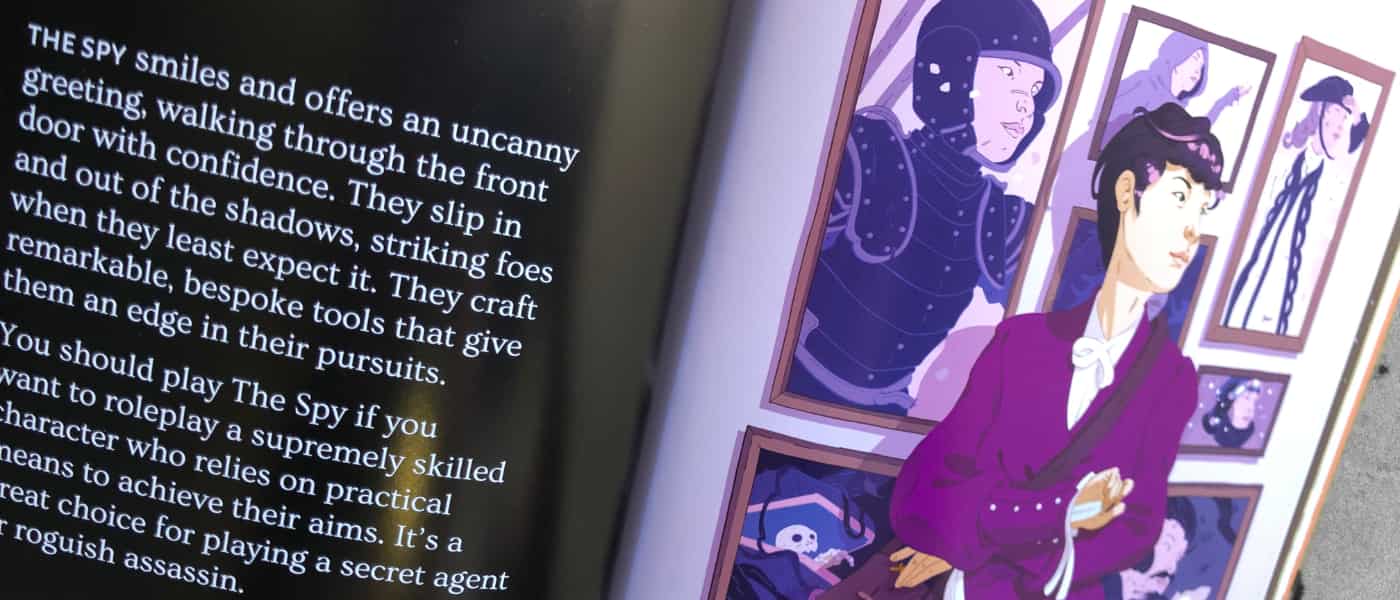First Look: Quest
This is a first look at the Quest tabletop RPG. It appears to have two primary design goals: to serve as an easy onramp for tabletop roleplaying newcomers, and to facilitate smooth online play. I won’t attempt to judge if it succeeds in those goals definitively, as I don’t believe it’s possible to issue such verdicts on a game I haven’t played. These are merely initial impressions as I dig into the game.

Aesthetics
Quest is a charming book. The illustrations evoke spirited, almost whimsical adventure. Big bold copy and plenty of white space invite the reader to explore further.
Explanations
Rules aside, describing tabletop roleplaying has never been easy. It’s like trying to explain a dinner party or a birthday party. There are certain rituals involved, but the goals and behavioral norms and tone of these activities defy pithy encapsulation. Quest does it well, though.
Readers learn how to build characters by first defining what makes them tick and what distinguishes their behavior, as opposed to their stats. In fact there are no attributes to define a character’s strength, smarts, and so on. It’s all a matter of description.

For the Guide (gamemaster), Quest provides easily-digestible, practical prompts that help build out the world and get the game going. Like the player process, it’s a clever combination of broadly-applicable tips that provide an immediately useful path.
Genre and Setting
This is fantasy, but it’s not D&D fantasy. For one thing, there are no defined races. There are no alignments, and while Roles are akin to classes, they serve a somewhat different function. The eight Roles are: Fighter, Invoker, Ranger, Naturalist, Doctor, Spy, Magician, and Wizard.

There is no default setting, but Quest does have a loosely western medieval flavor with indistinct edges. By design, the game could be run in pretty much any setting that featured blades and magic. That said, stylistically and mechanically this doesn’t at first blush look like a game for grim, horrific sorts of adventures.
Mechanics
In Quest there are no predefined races. NPCs and creatures are defined by hit points, the amount of damage they can deliver, and any special abilities they might have.
Armor has no mechanical effect, and damage is not random – for player characters unarmed damage does 1 point, and weapon damage does 2 points. Every player character starts the game with 10 hit points, so assessing the danger of a situation is pretty straightforward. Hit points and damage appear to operate more as narrative tools than as representations of life force remaining or taken away.
To keep combat from being predictable, there are a range of outcomes between triumphant success and abysmal failure on every d20 roll: Triumph, Success, Tough Choice, Failure, and Catastrophe. Again, there are no modifiers, so success is never assured and failure is always possible.
That keeps things unpredictable, but what distinguishes characters from each other mechanically? Their Abilities do. Each Role has an array of Abilities from which to choose, and as a character advances, they may acquire more of them. Abilities can be spells, special combat effects, or other benefits.
Big Picture
While the game world is not defined in any specific way, it takes place in the Omniverse, a set of worlds within worlds that imply room for a potentially infinite array of expansions and variations. The game is also licensed under Creative Commons CC-BY 4.0, and plans are afoot to build out a marketplace for third-party content. The Quest Discord is quite active, and the author appears to be very engaged in it.
Additional Bits
A bunch of magic items, some very clever and fun, are included. No creatures are described in the print book but a creature deck with 22 beasties is available for separate purchase. A PDF of the deck is part of the batch of files you get when you buy either the print book or the digital edtion. While the book doesn’t include a sample scenario, there is a free starter adventure on the Quest website.
Parting Thoughts
I do wonder how the game plays over an extended period of time. Aquisition of new Abilities is the primary means of mechanical advancement, but in actual play I’m not sure what player expectations of advancement would be. Will rapid advancement be less important to most players in Quest, since mechanically there are fewer advantages to advancement? Will that relatively flat progression be boring for players?

Those questions aside, if I wanted to introduce a few friends to tabletop roleplaying, perhaps for a three-hour one-shot on a Sunday afternoon, I’d use Quest. It doesn’t have to be a game that gets played week in and week out to succeed – it just needs to provide a warm welcome to the world of tabletop roleplaying and fire the imagination and curiosity of newcomers. I suspect it will, and I’m looking forward to giving Quest a spin.
Ω